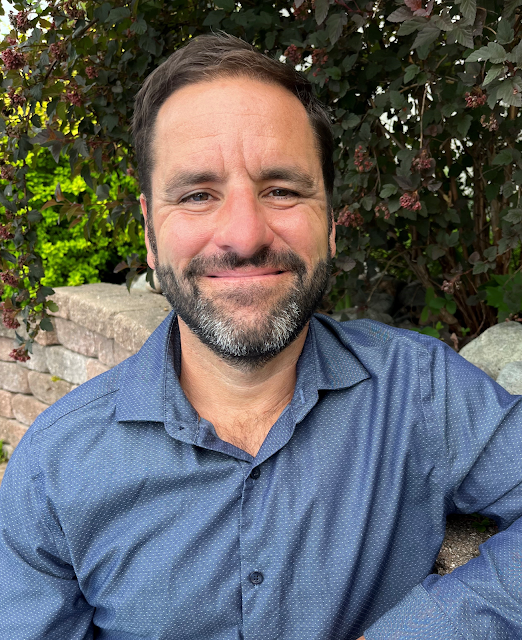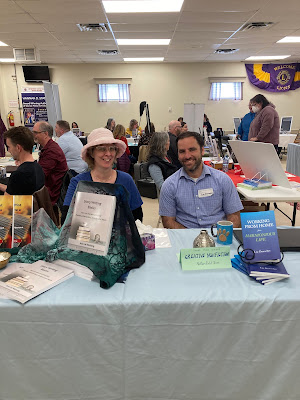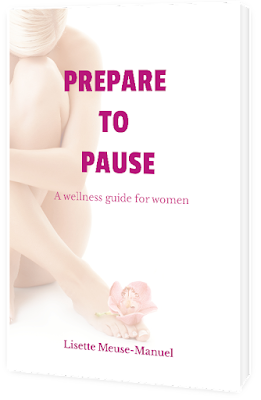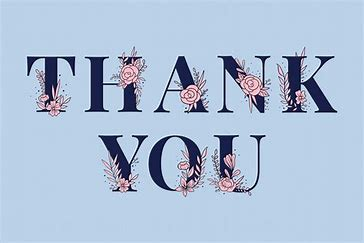Scribbler readers already have connections to Miramichi,
a beautiful area of our province. Sandra Bunting, James Fisher, The Miramichi Reader,
Chuck Bowie have been welcome guests. This week we can add one more.
Let’s meet Jeff.
Jeff R.
Kelland is a 64-year-old Canadian who possesses a genuine concern for the
welfare of people and society as a whole, and he has a fierce passion for the
written word. Jeff is a talented, experienced writer of innumerable essays,
magazine articles, editorials, poetry and prose that have appeared in a variety
of publications over the years. He holds a first-class honours B.A. in
philosophy and German, a Master of Science in Community Health from the School
of Medicine at Memorial University, and he has published a ground-breaking
thesis. Jeff is also a sought-after public speaker for various causes and
conferences, a visual artist, and he has been a veteran singer-songwriter and
entertainer for over 40 years.
Working Title: The novel: The Dying Party
The free prequel novella (available on all major platforms): Two
of All People

Synopsis: The Dying Party, along with its prequel novella Two of
All People (available for free on all major book-selling platforms),
asks the question: ‘What happens when they tell us it's too late to stop
climate change; when we are forced to face a future that will be increasingly
hellish, and an horrific end that will come within our lifetimes?’ The novel
answers this question with two parallel story lines that alternate from chapter
to chapter and eventually merge – one about how the poor will deal with the
advancing crisis, and one about how the rich and powerful will fare.
The former story line, starting a few years earlier in the prequel novella,
focuses on two main characters. It is late in the 2040s, and Lizzie and Donnie
are two of only six people left alive in a residential complex that had been
built into the side of Newfoundland’s Gros Morne mountain in the 2030s, now the
only piece of habitable land left above water in all of what was once eastern
Canada. In the second story line we follow a group of humanity's richest and
most powerful, the super-elite, as they try to establish an off-Earth colony
for themselves.
The Dying Party and the prequel novella explore in fascinating
detail the complex brutality of what having to accept such a fate would mean
for human civilization; what it would look like on a global scale, in a local
context, and from a variety of personal perspectives. The author’s extensive
research shows that if we stay on our present course of inaction, confusion,
and complacency, such a declaration will come sooner than we think. The thrust
of the novel, however, is to illustrate the under-appreciated impact that
passing the climate change tipping point will have on the human psyche; an
impact that will further complicate and accelerate what is happening on a
number of levels.
This is not fanciful speculation about the near and distant future, but rather
the logical extension of the current course of humanity if we continue to fail
to up our game. The Dying Party is a courageous, unflinching
depiction of the worst-case scenario with a measure of redemption. It is,
therefore, a cautionary tale to end all cautionary tales.

The Story Behind
the Story: My approach to
writing novels is simple and straightforward – I identify a topic that needs
more awareness on the part of the general public, research all there is to know
about the topic, and then write a fictional story with a dynamic set of
well-defined characters that shines a bright and revealing light on the topic.
For example, even
after all the shocking revelations regarding the clerical child sexual abuse in
the Catholic church over the last thirty or forty years, there is still little
or nothing is being done to help these children, which made my first novel, Grace
Ungiven, necessary. Similarly, my research into the climate change
crisis, and into what we will need to do to successfully address the crisis,
revealed that little or nothing is being done to meet the substantial challenge
of climate change to date either, making it necessary for me to write and
publish my second novel, The Dying Party.
As soon as I
completed my research and realized that we have failed to make any meaningful
progress in combating climate change, I immediately knew that the best story I
could write to raise awareness and spur action would be one that takes the
current reality and brings it to its logical and troubling conclusion. I
decided I would depict human life on planet Earth as the consequences of our
complacency and inaction unfold over the coming few decades; to show the as yet
underappreciated impact on the human psyche of passing the climate change
tipping point, as individuals and as a race, and how it would only worsen and
accelerate the decline.
Aware as I am
that the contemplation of such an apocalyptic scenario for humanity will be
quite challenging and unsettling, the book includes an advisory/warning at the
outset that asks readers to seriously consider their spiritual and
psychological fitness before reading the book. I would also like readers to
know that the disquieting results of my research was very difficult for me to
deal with over the course of the almost two years it took to write, and living
with this knowledge since, as I watch ongoing news reports clearly showing that
my fictional story may well become true, is onerous. I honestly believe that
the results of my research are accurate and, if nothing changes, human life on
this planet will unfortunately come to closely resemble what I have laid out in
The Dying Party, and this will happen sooner rather than later.
With all that
said, I must confess that I have never wanted so badly to be wrong about
anything in my life.
Website: https://jkellandmysites.io/
A question before
you go, Jeff:
Can you tell us
about the perfect setting you have, or desire, for your writing? Music or
quiet? Coffee or tequila? Neat or notes
everywhere?
The most important
factor in my perfect setting for writing would be having complete and
uninterrupted solitude. It would also involve a lot of tea and classical music
on a low volume setting. And it would be easier to say that my workspace is
anything but neat and tidy, than it would be to describe what it looks like.
It’s not pretty!
An
Excerpt from The Dying Party.
Elizabeth
Antoinette Flint was born the only child of two stereotypical hippie-types from
Washington State. Among thousands of people on the flights forced to land in
Gander, Newfoundland on 9/11, bright-eyed newlyweds Chet and Amelia Flint were heading
to Europe for their honeymoon. Instead, they ended up making the best of it
where fate had put them – on a rugged pristine island in the North Atlantic
they affectionately call “The Rock”.
As
the world was dealing with the aftermath of the terrorist attack in New York
City, Chet and Millie were catching the spirit of the famously friendly island
and soon set aside their disappointment about the European trip. Heartily
cheered on by the boisterous, backslapping natives, prodigious drinkers all,
they made matrimonial merriment with the locals for ten days and nights. When
it was time to depart, their bittersweet sadness surprised them both – a special
seed had been planted in their bohemian hearts.
Back
to life on the Pacific coast, they tried unsuccessfully for eighteen years to
have a child. Then, inspired by a popular Broadway musical about the homespun brand
of hospitality Gander residents showed the stranded travellers that day in
2001, Chet and Millie returned to Newfoundland for a holiday in the summer of
2019 and never went back. Their search for a place where they could live off
the grid turned up many nice spots around the province, and they finally
settled on a cozy saltbox-style house in the little seaside village of Daniel’s
Harbour on the island’s west coast.
A
few months later, just
as the Covid-19 pandemic was taking hold around the globe, came an unexpected
bonus. The change of scenery had done the trick and Millie was pregnant. As
middle-aged flowerchildren who had all but given up on having kids of their
own, they were elated. They insisted on an all-natural home birth with a local
midwife, a harpsichord, two doves, and plenty of granola. And late in 2020, with the pandemic in full
swing, little Lizzie came to be. With the blessed arrival of their long-awaited
baby daughter in an idyllic pastoral setting they had both been dreaming about
since the sixties, they were all set to start living happily ever after.
That
was almost seven years before The Announcement.
* * *
Lizzie shifts around in her chair,
belaboring yet another sigh as Donnie sniffs and snarks his way across a room
littered with shadows and random pieces of trash. Barefoot, scratching his ass
through grimy gray sweatpants, shuffling through a dank stench that no longer
registers, he kicks an oil-stained cardboard box aside and stands before the
window. Raising both arms, he slaps his palms flat on the glass and allows
himself to look out at it again. Fuck.
Over just a few days, less than a
month ago, the day sky went from bright candy apple red to a dull flat crimson,
progressively more blood-like in color and texture. All that week it had been
streaked with black clouds, scattered, stretching across the sanguine
stratosphere like random lines scrawled on a bloody page. He realizes that over
the last three days it has been changing even more rapidly, and this evening it
has taken on an ominous shade of reddish purple that seems to be deepening
before his eyes.
The
horizon has been virtually imperceptible for weeks, ever since the last torrid
wave came through, smelting another ungodly layer of death upon death. Now it
is just a fuzzy white band of sickening haze that is becoming hazier with each
passing day. He can see it through the rippling sheets of heat rising from the
toxic soup that surrounds what is left of their shrinking, otherworldly piece
of wasteland. There is still some difference between night and day, but not
enough to matter much to anyone, and it has been a long time since anybody
could go outside and expect to come back. Daytime is dark, the night slightly
darker, both somehow strangely backlit. They sleep during the day, leaving the
challenge of conscious awareness for the night when it is harder to see what’s
happening outside.
Across
the globe the atmosphere is steadily breaking down, increasingly irradiated, no
longer a sufficient UV filter for earthly life. With no real polar ice caps
left to deflect the sun’s lethal rays, the Earth is superheating, and it is so
hot now that its axis poles are just beginning to shift, with widespread
seismic consequences. Volcanic activity has been rising sharply, and even
long-dormant volcanos are becoming reactivated. Earthquakes flourish
everywhere, triggering each other, setting off unprecedented chain reactions in
the equatorial regions, the so-called “Ring of Fire” around the Pacific now
literally so and visible from space. Thick, merciless waves of impossible heat are
sweeping indiscriminately across the world, and dense clouds of radiation have
started to form and maraud around the planet, riding the wind-driven air
masses, poisoning what little there is left to poison.
Looking out on the relative calm of
what was once the Gulf of St. Lawrence, Donnie is starting to worry about the
changes in the horizon and sky of late. He thinks about the sickening walls of ever
more toxic heat that have been passing over them in recent weeks, six now by
his count. The first five were so slow they didn’t see them approach, instead
gradually feeling them by the noticeable rise in the units’ temperature. But he
remembers that the last one was moving much faster than the others; this time
they could see it coming, and it was thicker, almost opaque. He knows it is
only a matter of weeks, maybe days, before the worst of it finally gets around
to the North Atlantic and finishes them too, taking all they’ve ever known and
all they’ve ever been...
Thank you for being our guest this week, Jeff. Wishing you continued success.
And thank you to our visitors and readers. Don't be shy. We'd love to hear from you.
















.jpg)












.jpg)